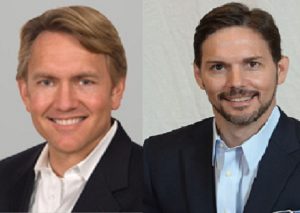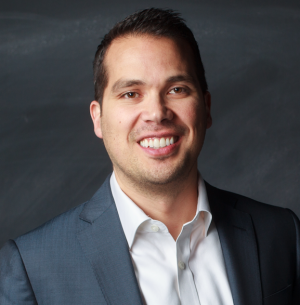The Most Important Law Firm You've Never Heard Of
How to crack the Am Law 200 without an office.

James Fisher and Kevin Broyles
I joined my video interview with the founders of the up-and-coming firm FisherBroyles last week thinking about law, but I ended it thinking about cars. If Cravath and Skadden are expensive high-end classics, like a Bentley or a Maybach, then FisherBroyles is a Tesla — new, exciting, and convinced it’s going to put the old guard out of business. FisherBroyles is challenging, at times risky, and pushing the envelope, and those who know about it are interested to see where it goes.
In FisherBroyles’s eyes, though, they’re selling space shuttles while the rest of the legal industry keeps hocking scooters. The FisherBroyles experiment is still in its early stages of unfolding, but any law firm that isn’t carefully taking notes and willing to make some adjustments may soon find itself staring at its tracks as it drives off into the future.

Legal AI: 3 Steps Law Firms Should Take Now
Stumbling Into a Big Idea
As James Fisher and Kevin Broyles tell it, their firm was born out of the dotcom bust. Both were working at a technology-oriented firm in the early 2000s. “Our plan was to represent technology companies that were high growth, get some stock options by going in house, go general counsel, and cash out as millionaires.” Instead, the bubble popped, and most of their clients ended up out of business.
With time on their hands, Fisher and Broyles decided to launch their own firm that focused on small companies with substantial upside. Because those clients generally don’t have a lot of cash available for attorney’s fees, Fisher and Broyles kept their overhead and rates at a bare minimum while they built up their respective books.
Lots of new law firms launch with that same concept, but as they grow they rent nice office space, raise their rates, and bring in associates to leverage. FisherBroyles didn’t follow that script. Its founders continued to primarily work from home, using cloud-based worksharing tools. They continued to do the work themselves, rather than bringing in new attorneys to pass the work down to. Those early cost-saving measures became the firm’s guiding principles.
Sponsored

Legal AI: 3 Steps Law Firms Should Take Now

Is The Future Of Law Distributed? Lessons From The Tech Adoption Curve

Navigating Financial Success by Avoiding Common Pitfalls and Maximizing Firm Performance

Navigating Financial Success by Avoiding Common Pitfalls and Maximizing Firm Performance
“We took away the two most inefficient aspects of the law firm model: the expensive fixed cost real estate, and the $180,000 a year associate being trained on the client’s time. And once you eliminate those two massive aspects of law firm overhead, that leaves a lot of capital revenue to pay your lawyers more.”
Under The Hood
FisherBroyles seems like an attempt to find out how much you can you take away from a law firm and still call it a law firm. Associates are out. There are only partners at FisherBroyles. While some partners work primarily for other partners, any attorney walking in the door has to be experienced and fully capable of handling themselves unsupervised.
Offices and secretaries are also largely out. If a FisherBroyles partner wants a secretary or dedicated office space, they pay 100% of that cost themselves. The firm leaves overhead decisions entirely in the hands of individual attorneys, so that no one pays for something they don’t use.
Discretionary compensation, what Kevin Broyles calls “the annual horror show,” is out in a big way. FisherBroyles’s compensation is 100% objective, based primarily on working attorney fee income, business generation, and file management. By minimizing friction points, Broyles and Fisher see themselves as freeing up their partners to continue working and bringing in business.
Sponsored

The Business Case For AI At Your Law Firm


Early Adopters Of Legal AI Gaining Competitive Edge In Marketplace
So far, the plan is working. The small “virtual” law firm has ballooned in the past couple of years to over 200 attorneys operating in over 20 major metropolitan areas. It stands poised to be the first ever non-traditional law firm to break into the Am Law 200 either later this year or early next. Given that new partners pay their own freight and have to bring in their own work, the cost to expand the firm is functionally nothing. The objective compensation system actually rewards bringing in new partners, sort of like an Amway for the Am Law set.
The Amazon of Law Firms?
I asked in this column last month whether there was a law firm that wanted to be the Amazon of Biglaw. I got the answer a lot faster than I expected, as Fisher and Broyles invoked Amazon comparisons several times during our discussion. In their view, they’ve invented a new type of law firm that will “eventually take over the traditional law firm model.” With their early-mover advantage, Fisher and Broyles think they’re “so far ahead of our next largest competitor that it would be virtually impossible for them to catch up.”
I’m not betting against them, at least not yet. Sure, some questions remain. For starters, FisherBroyles depends on traditional firms to train up new associates, who it can then recruit with promises of better work, fewer hours, and more money. If the old model firms went away, FisherBroyles would find itself without a training ground for its future partners. Someone would have to make up that difference.
The firm may also have to confront what happens when its partners become too successful. One of the animating principles of FisherBroyles was creating a firm where set, egalitarian principles control. But is it overly utopian? Finding ways to keep partners happy in a dynamic, competitive lateral recruiting environment without betraying the core mission of the company might be a challenge; though, if overhead is kept low enough, they’re betting there will be enough money to keep everyone happy.
But Fisher and Broyles aren’t the first revolutionaries to get told they couldn’t do it. I compared them to Tesla at the top of this column, which likewise faced a lot of questions in its early years. A lot of people told Elon Musk he’d never get his concept off the ground. Given the Roadster that just got launched into space a few weeks back, I’d say Tesla did alright for itself. And, if FisherBroyles makes the right steps at this early phase, it may follow suit.
Even if FisherBroyles isn’t necessarily what every law firm will look like in 30 years, I fully expect the model to be adopted more heavily. FisherBroyles has been quietly reinventing the fundamental firm model under the radar, and they’re about to start making major waves. Every law firm needs to be looking closely at this model and seeing what can be done to fold those kinds of strengths into its own practices.
Biglaw can’t ignore FisherBroyles forever. What happens as it starts getting noticed?
It’s going to be a fun ride.

James Goodnow
James Goodnow is an attorney, commentator, and Above the Law columnist. He is a graduate of Harvard Law School and the co-author of Motivating Millennials, which hit number one on Amazon in the business management and legal communications categories. You can connect with James on Twitter (@JamesGoodnow) or by email at jgoodnow@fclaw.com.







